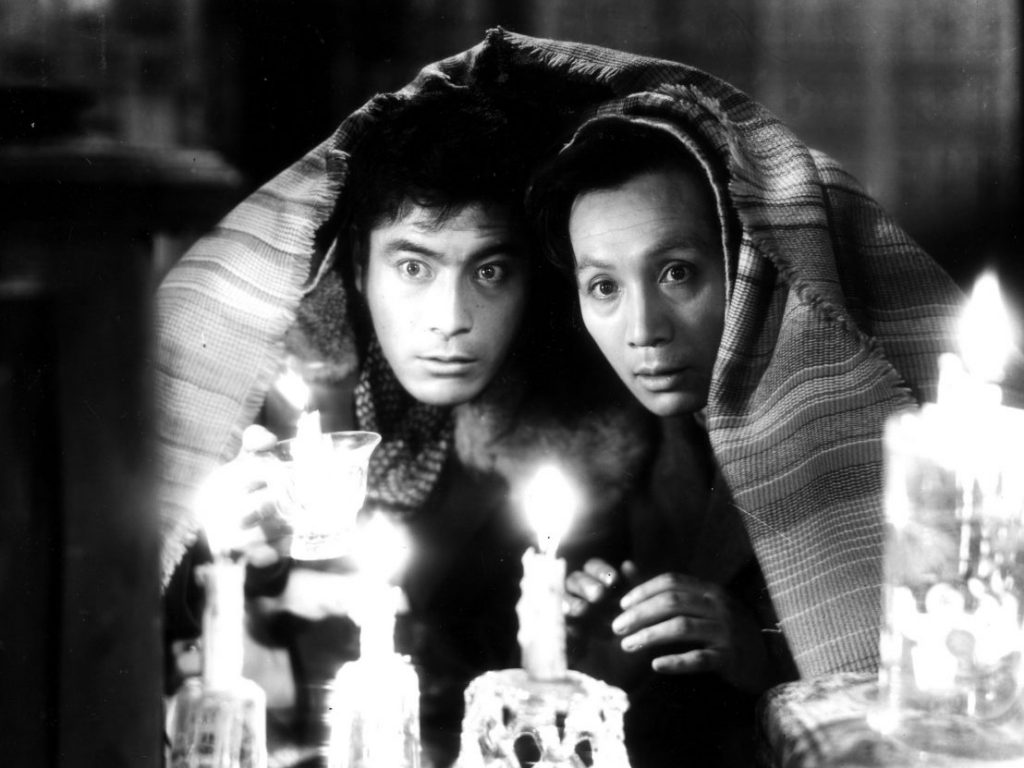
Most English speakers are familiar with the saying, “a rotten apple.” Employed as a sort of lame excuse for the bad behavior of some, it’s the end of the saying that makes it so much worse, “spoils the bunch.”
Do we develop metaphors to describe things/phenomena/feelings/people that otherwise elude description? It seems so. But do we then turn the metaphors back onto actual situations again? Less clear, but promising.
His only adaptation of a book from his favorite writer, Fyodor Dostoyevsky, Akira Kurasawa’s “The Idiot” turns the film into a larger metaphor for Postwar Japan, a nation traumatized, ashamed, destroyed and suffering a severe identity crisis. It also has a what-could-have been awfulness: the director originally intended the film to be nearly five hours long, and in two parts, but his backers, Shochiku, cut it to shreds, ending up a little shy of three hours.
No other work has been a better companion to Dostoyevsky’s unrelenting view of humanity than Akira Kurosawa’s much-maligned 1951 film Hakuchi. The original cut stood at 265 minutes, trimmed to 166 minutes by studio executives at Shochiku against the director’s wishes. “In that case, better to have it cut lengthwise,” he is said to have responded. Nobody knows what was left on the cutting room floor as Kurosawa was unable to locate the lost footage, leaving it impossible for audiences to follow the narrative of the film. Hakuchi was critically derided upon its initial release, finding only a handful of fans in Russia – among them Andrei Tarkovsky.
Hakuchi must have been a very special project to Kurosawa. It is one of his most important early works, and he refused to stray from a wholly faithful adaptation to the book unlike later on with his liberal interpretations of Shakespeare in Throne of Blood and Ran. And despite its obvious failings in narrative flow, no other Kurosawa film tells us more about Japan at the time or conveys as much intense emotional power as Hakuchi. His decision to transport the novel’s events from the glittering St Petersburg to wintry Sapporo on the northernmost island in Japan, is not a purely aesthetic one.
Perhaps a more obvious choice would have been Tokyo or Osaka, cities which are closer similar in spirit to St Petersburg. But then we would have been denied that remarkable scene at the beginning of the film. The thuggish merchant Akama (Rogozhin in the book, played by Kurosawa stalwart Toshiro Mifune) and Kameda (Masayuki Mori as Myshkin) stop before a portrait of the woman they will both destroy each other for, her gaze lit up by the blizzard. All around them, peasants struggle by with their carts and goods in the bitter cold. The darkness, both literal and metaphorical, is almost complete save for the faint falling snow, which makes the men’s faces flicker in the shop window. How difficult it is, Kurosawa seems to be saying, to bring light to a place where it is perpetually night.
An old stereotype valorises the purity of the “traditional way of life” in Japan, outside of the moral corruption of the big cities. This is epitomised in many classic novels including Yasunari Kawabata’s ‘The Old Capital’ from 1962. But Kurosawa situates the showy greed and lust of The Idiot in the heart of Japan’s rural outposts, turning this assumption on its head. There is no foreign malice come to take away the innocence of the people; they have nobody to blame but themselves. Fittingly, although the film is set in post-war Japan, the endless snow negates all reference to the time period. The struggle to do good in the world and to eke out a redemptive humanity requires no specific cultural context.
I have a deep reverence for The Idiot (as well as Poor Folk), and its rendering into a different medium brings up some good questions about the utility of metaphors themselves. Refracted cultural explanations of real life that slap back onto actual things; this is [one of the reasons] why, as soon as I heard about it, I couldn’t wait for Postmodernism to be over.


